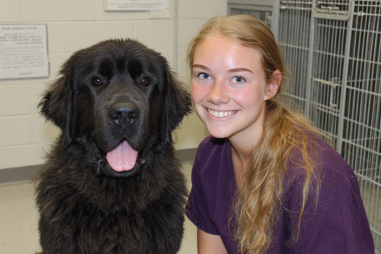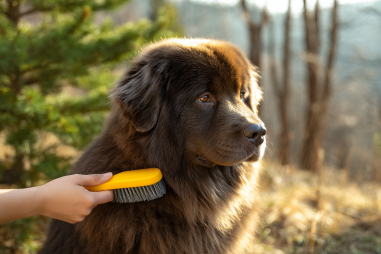Newfoundland dogs, with their thick double coats and gentle dispositions, are beloved companions known for their strength and loyalty. However, their large size and unique coat require special attention throughout the year. Like all dogs, Newfoundlands face seasonal challenges that can affect their comfort and health. From chilly winters to hot summers, understanding how to care for your Newfoundland dog according to the seasons can make all the difference in keeping them happy and healthy. This guide covers essential seasonal care tips tailored to your giant furry friend.
Winter Care: Coat Protection and Exercise
Newfoundland dogs thrive in colder weather thanks to their dense, water-resistant double coats, which were originally bred to keep them warm in icy conditions. However, winter still presents some challenges that owners should be aware of to ensure their dog’s warmth and safety.
Protecting the Coat: Although their thick fur naturally insulates them, snow, ice, and road salts can damage their coats and irritate their skin. It’s important to rinse off salt and de-ice chemicals after walks to prevent dryness or cracking. You can use a damp cloth or dog shampoo designed to maintain coat moisture. Avoid shaving your Newfoundland’s coat during winter; it protects them from cold and harsh weather.
Exercise in Cold Weather: Regular exercise helps maintain your Newfoundland’s muscle tone and mental well-being. However, be mindful of extremely low temperatures, as even these hardy dogs can suffer from frostbite on their paws, ears, and tail tips. Shorten outdoor times on very cold days and consider investing in paw protection like booties or balms that shield from ice and salt.
Indoor exercise alternatives, such as playing fetch or using interactive puzzle toys, can help keep your dog active during icy days when outdoor play isn’t feasible.
Summer Care: Hydration and Heat Avoidance
Summer poses a different set of concerns for Newfoundland dogs. Their thick, heavy coats that serve them well in the cold can also make them prone to overheating during hot months. Keeping your dog comfortable is crucial — heatstroke is a real risk for this breed.
Hydration Is Key: Always provide plenty of fresh water and encourage your Newfoundland to drink regularly. Carry water with you on walks or trips, and offer it frequently. Dehydration can sneak up quickly in warmer weather, especially for a large dog that generates a lot of body heat.
Avoid Peak Heat: Limit exercise to early mornings or late evenings when the temperature is cooler. Avoid walking on hot pavement, which can burn sensitive paw pads, and be watchful for signs of overheating such as heavy panting, drooling, or lethargy.
Cooling Tips: Providing shaded areas and access to water for swimming or wading can help your Newfoundland cool down. Many Newfoundlands love water, so a kiddie pool or a trip to a dog-friendly lake can be both enjoyable and cooling.
Grooming Adjustments for Seasons
Grooming requirements shift with the seasons for your Newfoundland. Optimal grooming helps maintain coat health, reduces shedding, and prevents matting that can trap dirt and moisture close to the skin.
In winter, brush your dog regularly to remove dead undercoat which can trap moisture and cause skin irritation, but be gentle to avoid damaging the hair’s natural oils. Bathe your dog less frequently during cold months to retain natural oils and prevent dryness.
During spring and summer, Newfoundlands experience a heavy “blowing” of coat as they shed their thick undercoat. This process can last several weeks. Increase brushing frequency to daily sessions using a de-shedding tool to help remove loose hair and prevent it from matting. More frequent baths help eliminate loose hair and keep the coat clean, but make sure to dry thoroughly to avoid skin issues.
Health Risks by Season
Each season brings unique health concerns that Newfoundland owners should monitor to keep their dogs safe and healthy.
- Winter: Watch out for frostbite on extremities, arthritis flare-ups in older dogs sensitive to cold, and cracked pads due to ice and salt exposure.
- Summer: Heatstroke is the primary concern, so recognize early signs and seek immediate veterinary care if suspected. Also, be vigilant for ticks and fleas, which are more prevalent during warm months.
- Spring & Fall: These transitional seasons can bring respiratory issues or allergies. Seasonal allergens such as pollen can cause itching, sneezing, or watery eyes. Consult your vet if symptoms persist.
Shelter and Environment Considerations
Newfoundlands need appropriate shelter that fits the seasonal demands. Because of their thick coats, they tolerate cold weather better and need insulated, dry, and draft-free spaces during winter. Adequate bedding away from cold floors will keep them warm and comfortable.
In contrast, shelter in summer should be well-ventilated and provide ample shade. Elevated dog beds that allow airflow underneath are ideal. Avoid leaving your Newfoundland dog outside for long periods during hot weather, even if shade is available, as they can overheat quickly.
Seasonal Nutrition Advice
Nutrition also plays a vital role in seasonal care. During colder months, your Newfoundland may require slightly more calories to generate warmth, especially if exercise continues actively. Focus on high-quality, nutrient-rich food to support their large frame and coat condition.
In warmer months, consider adjusting portions to match reduced activity levels and prevent unwanted weight gain. Omega-3 fatty acids and supplements like fish oil can help maintain a healthy coat and skin year-round. Always consult your vet before making significant changes to diet or adding supplements.
Keeping Your Newfoundland Comfortable Throughout the Year
Caring for a Newfoundland dog is a rewarding experience that requires attention to seasonal needs. By protecting their coat and paws in winter, ensuring cool and shaded environments in summer, adapting grooming routines, watching for seasonal health risks, and providing proper nutrition, you can ensure your gentle giant stays comfortable year-round.
Remember, your Newfoundland’s large size combined with their thick coat demands thoughtful care tailored to each season’s challenges. A little extra attention pays off with many happy, healthy years with your loyal companion.







